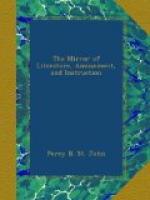that I had spoken only through others, and like him,
had hitherto seen by the glimmering light of translations.
It is upon such scanty data that young men reason;
upon such slender materials do they build up their
opinions. It may be urged, however, that if they
did not discourse freely with each other upon insufficient
information—for such alone can be acquired
in the pleasant morning of life, and until they educate
themselves—they would be constrained to
observe a perpetual silence, and to forego the numerous
advantages that flow from frequent and liberal discussion.
I inquired of the vivacious stranger, as we sat over
our wine and dessert, how long he had been at Oxford,
how he liked it, &c.? He answered my questions
with a certain impatience, and resuming the subject
of our discussion, he remarked that “Whether
the literature of Germany, or of Italy, be the most
original, or in the purest and most accurate taste,
is of little importance! for polite letters are but
vain trifling; the study of languages, not only of
the modern tongues, but of Latin and Greek also, is
merely the study of words and phrases; of the names
of things; it matters not how they are called; it is
surely far better to investigate things themselves.”
I inquired, a little bewildered, how this was to be
effected? He answered, “through the physical
sciences, and especially through chemistry;”
and raising his voice, his face flushing as he spoke,
he discoursed with a degree of animation, that far
outshone his zeal in defence of the Germans, of chemistry
and chemical analysis. Concerning that science,
then so popular, I had merely a scanty and vulgar
knowledge, gathered from elementary books, and the
ordinary experiments of popular lecturers. I
listened, therefore, in silence to his eloquent disquisition,
interposing a few brief questions only, and at long
intervals, as to the extent of his own studies and
manipulations. As I felt, in truth, but a slight
interest in the subject of his conversation, I had
leisure to examine, and I may add, to admire, the
appearance of my very extraordinary guest. It
was a sum of many contradictions. His figure was
slight and fragile, and yet his bones and joints were
large and strong. He was tall, but he stooped
so much, that he seemed of a low stature. His
clothes were expensive, and made according to the most
approved mode of the day; but they were tumbled, rumpled,
unbrushed. His gestures were abrupt, and sometimes
violent, occasionally even awkward, yet more frequently
gentle and graceful. His complexion was delicate,
and almost feminine, of the purest red and white;
yet he was tanned and freckled by exposure to the
sun, having passed the autumn, as he said, in shooting.
His features, his whole face, and particularly his
head, were, in fact, unusually small; yet the last
appeared of a remarkable bulk, for his hair
was long and bushy, and in fits of absence, and in
the agonies (if I may use the word) of anxious thought,




